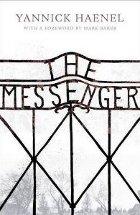The Messenger by Yannick Haenel

Translated by Ian Monk. Text Publishing, 2011. ISBN 9781921758003.
(Age17+ years) The Polish ghettos and the death camps established by
the Nazis during
World War 2 for the elimination of the Jews were hidden from the eyes
of the world. This book tells the story of one man, Jan Karski, who,
although not a Jew, did visit both the Warsaw ghetto and one of the
death camps so that he could take first hand knowledge to the allies
about the fate of those incarcerated. As a young Polish officer at the
start of the war Jan Karski escaped both the invading Germans and
Soviets to become a runner for the Polish underground. In 1942 he was
smuggled into the Warsaw ghetto by two Jewish leaders and asked to
inform the 'civilized' world about what he saw, to carry a message to
open the eyes of the allies to what was happening to the Jewish people.
It is an understatement to write that he was shocked by the suffering,
there in the ghetto and in the camp he succeeded in visiting. Through
contacts in the Polish government in exile he took his terrible message
to England and the United States. His appeals to the allies were met
with disbelief and even, he suspected, boredom. His message rejected,
he had to live with both the horror of what was happening and the
belief that the allies were compliant. The book is tripartite; the
first section describes Karski's appearance in the Claude Lanzmann
movie Shoah, the second is a summary of Karski's own book Story
of a
secret state (1944), and the third is a fictionalized version of
Karski's attitudes/philosophy many years later. In the first section we
see on camera how Karski resisted his memories, and then the horror of
the images that he gradually offers. The second section describes his
life as an agent, his difficulties, being captured and tortured, and
finally reaching the 'land of the free'. The final section is an
imaginative reconstruction of Karski's life in New York, his
sleeplessness, his attempts to escape the past by suppressing memories,
and his final embracing of the need to bear witness. This is the story
of a man who still believes that his message has not been heard, and
that he therefore still carries the message. So disgusted by the camp,
he believes that he died afterwards, but came back to life to carry a
pinpoint of light that he continues to try to shine on those terrible
events. The story is compelling, horrifying and challenging, and could
make an illuminating comparison with the movies The Pianist or
Schindler's List, or with the Jacobson novel The Finkler
question.
It is recommended for capable senior students.
Jenny Hamilton